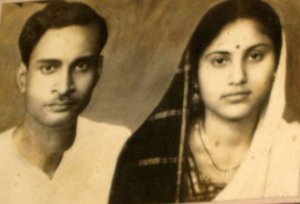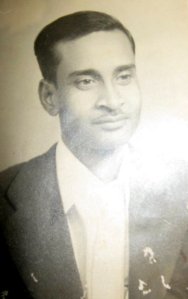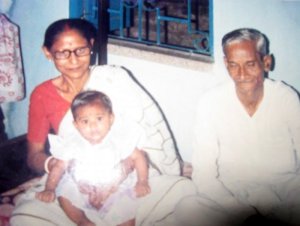On 11 June 2014, Wednesday, my maternal grandfather, Mr. Sudhir Chandra Ghosh breathed his last. He was over 90 years of age and age related complications were the cause behind his death. He left behind his wife and companion for over 50 years, my Didun (my maternal grandmother) and his three children.

By all means, I perceive Dadu’s life as a life of extreme discipline, thought, success and one that was well lived. As a man who traced his ancestral origins to the erstwhile Purbobongo (present day Bangladesh), he knew the value of hard work and education. There were no godfathers around and he traced his journey on his own. As most middle class men of his age, he understood the importance of education in one’s life. He understood that education only is the biggest social ladder for the middle class Indian living in independent India and probably that is the reason he emphasised and invested all his resources in educating his three children. All three of them are extremely successful in their chosen spheres of life. My boromamu (elder uncle), and his first born, is a very senior officer working with a Government of India organisation. My mother being his second child, chose to be an extremely successful homemaker and my chotomamu (younger uncle), the youngest of his three children, holds a very important position in a very reputed private sector organisation in his chosen field of work. Both his sons studied to be engineers and I am talking about an age when engineering meant hard work and patience, not degrees sold to anybody and everybody.
He had seen all of them flourish and attain success in life. In fact, he even saw two of his eldest grandchildren complete their degrees, fetch a job and in my case, getting married also. For the younger two, he could see my sister complete her class twelve boards with flying colours (the college admission process is underway) and the youngest one is slated to appear for his class ten boards next year.
I always shared a relationship of awe and distance with my maternal grandfather. He spoke very little and most of the time he did, he spoke about the importance of discipline in one’s life, one principle that he had tried to instill in his children through out his life. I was and I am still the proverbial lazy kid and I abhorred the fact that I had to wake up everyday before 7 AM whenever I visited my mamabari during the holidays. The sleep loving genes which I inherited from my father’s side of the family was something which was a bone of discontent with my Dadu. He always told me about why waking up and starting your day early was important for health and happiness.
Through out his life, he maintained his stance about punctuality and discipline. My mother’s aunt often used to jokingly call him “Ghoribabu” or the one with whose punctuality you can trust and match your watch’s time settings. A rarity in a Bengali household, he used to wake up by five o’ clock, have his break fast at an assigned hour, read his daily dose of “The Statesman”, have his lunch at around noon, sleep for a measured time and then wake up again to watch news. He would have an early dinner and sleep early. He retired long back and I never saw him going to work but my mother tells me that he was always meticulously punctual about his official duties also. In fact, late in his life, he used to get angry on my grandmother sometimes and complain to my mom that she forgot to do something on the assigned hour probably because she was watching her favourite serial or given to the lazy charms of old age.

He was a frugal eater and never had I seen him expressing himself about fondness for any particular food item. My mother has somehow managed to inherit this bit which is obnoxiously absent from me. My Didun is a wonderful cook and I sometimes wonder how can a man who was married to her for so long be so quiet and unassuming about food. But that was him. It even surprised me more that the person who I had never seen or heard speaking about the very Bengali trait of ‘gushing’ about food was the one loved to feed others. He was the one who probably would have probably given up eating Ilish mach long back, but he would definitely visit the neighbourhood market every morning to find the best Ilish mach available for you. He loved treating guests to the best available variety of fishes and seasonal vegetables that the growing “Mofussil’ town of Sodepur had to offer.
Probably one generation from now, the Bengali will not know the art of “Bajaar Kora” or going to market every morning to find the best varieties of vegetables and fishes. But “Bajaar Kora” and the unparalleled joy that the activity provided to Dadu was something that I will always identify with. One of my everlasting images of him will be that old but very steady, tall and lanky man, clad in his pristine white Dhuti Punjabi coming back from the market and then telling my Didun and others about what did he get today, which one was fresh and which fish he did not buy because he could spot the signs of it being frozen for the past few days. I never saw him going to the market, the perennial late riser that I am, but I remember seeing him coming back and discussing the increasing cost of vegetables and fishes and food items with my father or borormamu or chotomamu. He loved doing this daily chore of “Bajaar Kora”…something which was forcibly stopped after he fell down in the market a few years ago. Age was fast catching up with him. His children were concerned and the ban was forcibly exercised, but I suppose this was one thing that he became very unhappy about. “Bajaar Kora” was his window to the outside world after retirement. He met people, spoke to them, had a lazy chitchat around the town’s chowk. He often vented out his disapproval when he was served freshly cooked fish which might have been kept frozen in the refrigerator for barely one day. We often hear that people of older generation had the ability to smell out good from the bad and the fresh from the stale. I had an example closer home. And this was not only about fish, the fresh/stale, good/ bad judgement skill were bestowed upon him due to his years of experience and probably because of his disciplinarian and rational mind.
My Didun being the proverbial, very lovable grandmother and one with whom I am extremely attached to, is very religious. She visits temples, says prayers and organises pujas. But I do not remember seeing Dadubhai being overtly religious. Do not get me wrong, I never had a conversation with him about spirituality and his beliefs in God. He was a believer, but never pompous. Coming from a generation which had seen the gory details of numerous religious battles which killed and scarred families, he probably understood the futility of it all, but then again..I do not know.
Another lasting image of him, will be his love for his grandchildren. He never expressed all of that when we grew up but I distinctly remember him taking care of my boromamu’s son, taking him in his lap and walking around the balcony during the early hours of the day when he was a very small kid. My mother told me that he often did the same with me when I was of that age and whenever I visited mamabari. He could not repeat the same for my sister and my chotomamu’s son who were born much later, due to his health conditions but the affection whenever he heard about any of our achievements was palpable. He was very fond of Deep, my boromamu’s son and much later, when he was much older and my chotomamu’s son Wiju, who is much younger than all of us, shared a wonderful grandfather-grandson relationship with him. I remember this incident when Wriju was once going to school and waiting at the doorstep that he saw Dadu reading his daily Statesman. He went up to him and told “Dadu, if I were you, I would have been reading the newspaper and if you were me, you would have been going to school.” He was probably not eager about going to school, but his intelligence about drawing the comparison impressed Dadu for sure.

And The Statesman was something that he adored. It was only very recently that I saw The Telgraph making inroads in my mamabari. Before that, Dadu always made sure that the vendow who tried to push for a joint “Anandabazar Patrika- The Telegraph” combination was shown the door. Statesman lost an ardent fan yesterday. One who was very particular about his own things, his style of maintaining them, one with a deep sense of self respect and one who was extremely house proud.
Dadubhai had purchased the piece of land in Sodepur where our Mamabari presently stands probably after retirement with his savings. He had a dream of building his own house and when that dream came true a few years later, he did not want to leave his house even for a day. Numerous times, my Didun visited our house in Lake Gardens alone, because Dadu did not want to come. He was conerned about who would lock the main door in the night. even though my Chotomamu assured him, he would still be thinking. the last time he visited out house or went out anywhere for a long spell of time was in 2011, during my wedding. My Didun used to complain that she could not go anywhere because Dadu will not go and she could not leave her alone. Today when I spoke to her over phone, cutting across thousands of miles of distance and longing, she told me that she felt alone.
She lost a companion for life, one with whom she had shared numerous ups and downs in life. My mother and my uncles lost a father. My father who had lost his own father at a very young age and called him “Baba” lost a father figure. So did my two aunts. I, my sister, Deep and Wriju lost a grandfather. I have never seen my paternal grandfather, I have lost my paternal grandmother in 2006 and yesterday when my husband told me that a grandparent’s death makes you recognise the fact that slowly the numbers of your true well wishers in the world are decreasing, the ones who unconditionally wishes you well, I agreed with him. I am blessed to have another set of grandparents in my life, my Chotoamma-Dadubhai (my father’s uncle and aunt) and I wish they live longer and so does Didun.
Dadubhai, in your death also, you maintained that one simple stance that you followed in life, about being as less dependent on somebody for anything. Didun told me that she expected you to return home from the hospital and she was already looking for an attendant, but probably you did not like the idea of being bed ridden and dependant. But as of now, Dadubhai, wherever you are, be happy and I hope you continue to be that perfect example of discipline and self respect that you have been for us all this while.
A few years from now, people might not even be able to fathom or think that people like you, simple and independent, ever existed on this planet.

Moving tribute and I’m sorry for your loss. My condolences to you and your family.
LikeLike
Thank you for the kind thoughts 🙂 Hope he finds peace wherever he is.
LikeLike
খুব সুন্দর লাগলো লেখাটা। 🙂
তবে সমবেদনাও জানালাম।
LikeLike
অরিজিত, দাদু কে নিয়ে কাল লিখতে বসে ভাবছিলাম যে লেখাটা লিখব কিনা। কারণ আজকাল মৃত্যু সংবাদ মানেই তো মেকি “RIP” জাতীয় কথাবারতা। কিন্তু আমি চেয়েছিলাম একটি সফল জীবনের কথা বলতে। সফল বলতে দামি গাড়ি ইত্যাদি নয়, ওদের সময়কার লোকেরা মূল্যবোধ বলতে যা বুঝতেন, সেরকমটা। আশা করি সেটা বলতে পেরেছি।
LikeLike
It is a huge loss – there is pain, a void but there is no regret because it was a life well lived. It is a life worth celebrating and that is what you have done so beautifully here. I was strongly reminded of my paternal grandfather who is largely responsible for who I am today. Discipline, punctuality, integrity as well as love for The Statesman, ‘bajaar kora’ are traits that belonged to a generation that knew how to lead life – a meaningful one. My prayers for you and your family.
LikeLike
Really, a generation from now on will never know how simple living can actually be pleasantly warm and happy, nor will they know about “The Statesman” and “bajaar kora”. I wanted to tell the story of a very successful life, success not measured in monetary terms but the fact that he instilled values which made my mother and my uncles very good human beings. Thank you for the kind thoughts Ria, will convey 🙂
LikeLike
🙂 Contentment is the key to a peaceful and happy life – and that is what the generation of our grandfathers and grandmothers have embodied.
LikeLike
Yes Ria, today we have abundance of many things in life, but we are hardly content.
LikeLike
Loved it
LikeLike
ভালো লাগলো শুনে। মৃত্যু অনিবার্য সত্য, কিন্তু জীবনের মূল্যবোধ আর স্মৃতি গুলো থেকে জায়…আর আমার বিশ্বাস একটা সফল জীবনের পরিচয় সেখানেই।
LikeLike
Haan sofol Jibon..otai kammo..mrittyu toh duto manusher moddher durotto kebol…jonmer moto eo ek maya…shob Poromaatma r khela..
LikeLike
a touching personal post – i am sure his spirit will be watching over you
LikeLike
I hope too 🙂 I believe grandparents always wish us well and will be there to support us, visibly or invisibly, whenever needed 🙂
LikeLike